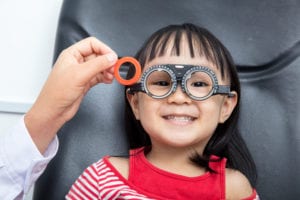
Start Early, Stay Consistent
Boy, this phrase could apply to so many things in life! When it comes to a child’s vision and general eye health, parents may be surprised to learn that exams should begin halfway through the first year of life. Up until age six-months, infants primarily see objects that are near to them, and only stronger colors, such as black and red. It is around 6 months of age when vision starts to come together. At this time, an eye exam can assess the ocular structures and confirm that the eyes are working well together.
After the initial eye exam, hopefully, at six months, the second exam should take place between 3 and 4 years, and another just before kindergarten. School-aged children should see the eye doctor once a year.
What may be Revealed in a Pediatric Eye Exam
Vision problems such as near- or farsightedness and astigmatism are not reserved for adults. An early childhood exam enables parents and their eye doctor to ensure good vision with corrective lenses. Another problem that may affect young children, lazy eye (amblyopia), also shows up early in life. Lazy eye may be treatable using an eye patch over the healthy eye to building strength in the other.
Make no Assumptions
It is easy to think that a child would tell you if there were a problem with their vision or eye health. Often, they simply don’t know what’s happening. To see objects through blurred vision may feel completely normal if a child has had no other experience. This is why early routine eye exams are so important to a child’s development and overall well-being.
Parents are encouraged to speak with their pediatrician or our staff for recommendations about pediatric ophthalmology.
